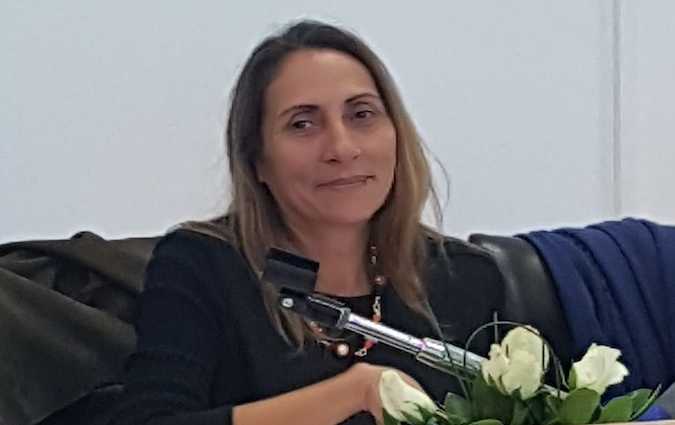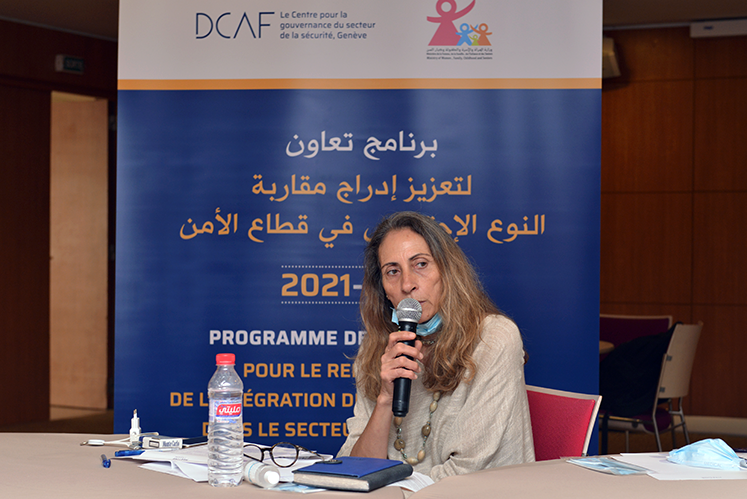Tackling violence against women through reform of the security sector in Tunisia
Since 2011, the Tunisian government has placed particular emphasis on security sector reform to establish effective, accountable, participatory security sector that respects the rule of law and human rights, including gender equality.
Gender equality is an integral part of the reform process. It contributes to consolidating state and human security, and combating gender-based violence.
The Tunisian government has taken several measures to address gender-based issues with significant achievements but is still facing many challenges.
Monia Kari, a women’s rights activist, academic and former director of the National Observatory for the Fight against Violence against Women, presents her thoughts on these reforms.

Monia Kari, on 12 August 2020, during her appointment as head of the National
Observatory for the Fight against Violence against Women. Photo: Business news
WHAT ARE THE NEEDS AND PRIORITIES TO ENSURE A BETTER RESPONSE BY SECURITY AND JUSTICE ACTORS TO WOMEN WHO HAVE BEEN VICTIMS OF VIOLENCE?
First, awareness-raising and training are fundamental to reinforce the capacities of the actors involved with victims of violence.
It is also necessary to improve their working conditions for a better care of the victims. It is crucial to emphasize the urgent need to rehabilitate the premises of the special units and provide the necessary equipment for them to take care of women and children victims of violence in accordance with the provisions of the Organic Law No. 2017-58 on the elimination of violence against women as well as international standards.
Finally, developing a synergy between all actors of the support system is essential for the victims to obtain justice. An efficient and coordinated support system, including guidance and referral, allows for an adequate response to the needs and interests of victims.
Developing a synergy between all actors of the support system is essential for the victims to obtain justice.
Monia Kari, women's rights activist
WHICH ACTIONS OR MEASURES HAVE BEEN TAKEN IN TUNISIA TO STRENGTHEN THE CAPACITIES OF THE ACTORS OF THE SECURITY AND JUSTICE SECTORS AND IMPROVE AVAILABLE SERVICES TO HELP REDUCE VIOLENCE AGAINST WOMEN?
Intersectoral mechanisms for the care of women victims of violence have been created to ensure appropriate and quality services, introduce new practices for taking care of women, and generalize them throughout the country.
In addition, since 2019, the Ministry of the Interior has been developing a sectoral plan for the integration and institutionalization of the gender approach and equal opportunities between women and men.
The Ministry of Interior has also conducted an analytical study to evaluate the situation and working conditions of the specialized units.
To collect statistical data, a computer system has been developed to manage complaints specific to violence against women and children according to indicators established for this purpose.
WHAT IS, IN YOUR OPINION, THE CONTRIBUTION AND IMPACT OF LAW 58 ON THE FUNCTIONING OF THE SECURITY AND JUSTICE SECTOR?
Tunisia considers the fight against violence against women among its priorities and the adoption of Law 58 to do just that is a great achievement and a major step forward.
The adoption of Law 58 [...] is a great achievement and a major step forward.
Monia Kari, women's rights activist
Law 58 adopts a comprehensive approach based on prevention, protection, care, and prosecution. It enshrines a broad definition of violence and encompasses its different forms, and creates accountabilities for all actors involved in its implementation. It also provides new protection mechanisms and recognizes significant rights for victims.
In terms of deterrence, the law establishes new offences such as political and economic violence, moral violence in couples, and street harassment.

Monia Kari at the workshop "Evaluation of gender mainstreaming in the security and
justice sector", organized to launch the cooperation programme between DCAF and
the Ministry of Women, Family, Childhood and Seniors. Photo: DCAF
WHAT ARE THE MAIN CHALLENGES IN PROMOTING GENDER-RESPONSIVE REFORMS AND HOW CAN THEY BE OVERCOME?
To overcome the remaining challenges, it would be appropriate to start by deconstructing the stereotypes rooted in society and particularly among security and justice providers.
A good start is the increase in the number of women in the police force and the specialization of law enforcement officers dealing with cases of violence against women.
Internal management measures should be adopted by the Ministry of the Interior, such as evaluating the interventions made by the security forces, encouraging and rewarding initiatives and projects carried out by the latter in the fight against violence against women, recruiting specialized units agents through a competitive process, and reducing the mobility of the agents trained in the treatment of investigations of violence against women.
The continuity of awareness-raising and training programmes of internal security forces must be maintained. Police must have a danger assessment tool designed to measure the intensity of the danger through a series of questions asked to the victim. Police officers will then be able to precisely apprehend the risks incurred and offer appropriate protection and support.
Finally, it’s essential to give the necessary resources to the actors of the security and justice sectors to better respond to the needs of the victims and to allocate a specific budget to this effect.
To learn more about DCAF’s work in Tunisia, visit our webpage: https://www.dcaf.ch/tunisia
 Share on Facebook
Share on Facebook Share on Linkedin
Share on Linkedin Share on Twitter
Share on Twitter